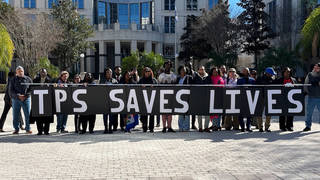
Guests
- Shirsho DasguptaMiami Herald reporter.
- Thomas Kennedypolicy analyst at the Florida Immigrant Coalition.
Hundreds of people who were once detained at the troubled immigration jail in the Florida Everglades, dubbed “Alligator Alcatraz,” have disappeared. Democracy Now! speaks with Shirsho Dasgupta, a Miami Herald reporter who found that, as of late August, about two-thirds of the 1,800 immigrants who were held there in July have gone missing from ICE’s online database, with their families and attorneys unable to locate them. Earlier this month, a federal appeals court ruled the jail could continue to operate despite reports of abuse.
“What we’re seeing at Alligator Alcatraz is basically a new model of immigration detention, where a state-run facility is operating as an extrajudicial black site, completely outside of the previous models of immigration detention in this country. And it’s making what was already a terrible system somehow even worse,” says Thomas Kennedy, policy analyst at the Florida Immigrant Coalition.
Transcript
NERMEEN SHAIKH: Hundreds of people who were once detained at the troubled immigration jail in the Florida Everglades, dubbed “Alligator Alcatraz,” have disappeared. The Miami Herald reports about two-thirds of the 1,800 immigrants who were held there in July have gone missing from ICE’s online database, with their families unable to locate them. Earlier this month, a federal appeals court ruled the jail could continue to operate despite reports of abuse. Trump welcomed the news.
PRESIDENT DONALD TRUMP: I think Florida has done a great job by building it. And whether it’s Alligator Alcatraz or anything else you want to call it, it’s an amazing facility for what it is. It’s not a hotel. It’s not supposed to be a hotel. But they’ve done a great job with it.
AMY GOODMAN: For more, we’re joined by two guests. In Miami, Thomas Kennedy is a policy analyst with the Florida Immigrant Coalition. And in Washington, D.C., Shirsho Dasgupta is a reporter with the Miami Herald who co-wrote the new report headlined “Hundreds of Alligator Alcatraz detainees drop off the grid after leaving site.”
We welcome you both to Democracy Now! Shirsho, let’s begin with you. You broke this story. Talk about how you got this information, what documents are available, how many people are missing or disappeared.
SHIRSHO DASGUPTA: So, my former colleague Ana Ceballos obtained two rosters of Alligator Alcatraz detainees in July, and those rosters accounted for a total of a little more than 1,800 men who were held at the facility. After a month, around end August, when the facility was winding down its operations, we matched the detainees in the rosters to ICE’s online locator system, and we found that around 800 of them had no records, and roughly 450 of them had a result called “Call ICE for details,” which is a pretty vague notation. We spoke to attorneys who said that that notation can mean anything. It could mean that someone is being processed for intake into a facility. It could mean that someone is being transferred from one site to another, or it could also mean that a person is about to be deported.
NERMEEN SHAIKH: And, Shirsho, can you tell us whether anyone has indeed contacted ICE to find out what’s happening with these detainees?
SHIRSHO DASGUPTA: Yes, we spoke to the attorney and family members of one person who was held at Alligator Alcatraz. He’s a Cuban national named Michael Borrego Fernandez. He was at the site for around a month, and in early August he was shifted to Krome Detention Center in Miami, which is a federal detention center, unlike Alligator Alcatraz. Then, around Labor Day, his family realized that he has been — he has been sent to a federal detention facility in San Diego County in California, and they got this information through the online locator system. But he stopped calling them, and when his lawyer tried to contact him in the California facility, the staffers there kept telling him that “We don’t have anyone by that name. You should call ICE.” And then the lawyer went to ICE, and ICE would just refer him back to the California site. And this went on for around a week, until they finally heard from him. But by that point, he had already been deported to Mexico.
NERMEEN SHAIKH: And, Shirsho, talk about the significance of this. I mean, what is the distinction, in practical terms, in other words, in the ways in which detainees are kept track of and processed through the immigration system, in a federal agency versus a state-run facility?
SHIRSHO DASGUPTA: So, if a detainee is in a federal facility, they will appear in some form in the ICE case locator, and attorneys will have access to them. It is a very complex process, but attorneys know how to navigate this process. They know who to call. They know how to set up interviews with these people. They know how to have private calls with their clients.
But because this was a state-run facility, there were jurisdictional issues, because it was a very rushed process in which the site was set up. There was a — issues surrounding legal access between attorneys and clients. And, you know, even when they were transferred out of this facility, I’ve spoken to attorneys who’ve said that, you know, “We don’t know who to call. Sometimes we call a person who’s listed as the contact person or is the contact person at, like, a site where he’s supposed to be kept, but we don’t even know whether that person is the right individual to call to set up a discussion with my client.”
AMY GOODMAN: And what is the state saying to you, Shirsho? What is Florida — explaining that difference between federal and state, and what DeSantis, the governor of Florida, the deals he has made, the contracts, with the money flowing in, ICE getting more money now than they ever had?
SHIRSHO DASGUPTA: So, Florida — per our last estimate, Florida has spent more than $200 million setting up Alligator Alcatraz. And obviously, it was ordered to be — you know, operations to be winded down, which they did. But then an appeals court issued a stay on that order, so it’s a bit unclear about what’s happening at the site now. In general, the DeSantis administration has taken a very hard stance on immigration, and he has made Florida among — a leader in the states which are cracking down on violators of immigration laws.
But in terms of, you know, our story about people sort of falling off the grid after being moved out of Alligator Alcatraz, his office did not comment. They referred us to ICE, and ICE did not issue any comment either, despite multiple requests.
AMY GOODMAN: Thomas Kennedy, you work with the Florida Immigrant Coalition. Can you talk about the panic of families right now when they can’t find their loved ones? We’re talking about Alligator Alcatraz, which is the term that Republicans dubbed this Everglades detention jail, and also what they also have dubbed “Deportation Depot,” another jail in Florida. But talk about both and what the families are doing.
THOMAS KENNEDY: Sure. So, you know, we actually connected and worked with the family of Michael Borrego, who was just mentioned. And, you know, basically, this is what I call the administrative disappearances. Because Alligator Alcatraz is a completely state-run facility, and the state of Florida is trying to avoid a NEPA process, a National Environmental Protection Act environmental study, because this facility sits in ecologically protected land that actually has a dark-sky designation, they neglected to sign federal legal agreements that give the state the authority to detain immigrants. And because of that, it’s one of the reasons why the people detained there don’t show up in public databases, as previously mentioned. And that creates a host of problems for the family members and those detained there, right? By not showing up in these public databases, it is easy to deny them due process and legal recourse. People are deported promptly, before scheduled bond hearings.
People are hospitalized often. This guy, Michael Borrego, you know, we connected with his mother, Yaneisy, both of Cuban descent. He actually had to endure a hemorrhoid-related surgery while detained at Alligator Alcatraz and was transferred over to Kendall Hospital, where most of the hospitalizations that take place in that facility end up. And he was there for three days after his surgery and was immediately transferred over to Alligator Alcatraz again, where he did not receive adequate medical care for his recovery and was denied even the most basic medicine to alleviate pain, for example. And these hospitalizations, which, you know, also have included cardiac incidents, you know, follow-up — there was a guy that we met whose fiancée told us that he had exploratory heart surgery just a week before being detained and was suffering from a ruptured kidney while in this facility. These hospitalizations are not recorded nor acknowledged by the state of Florida, the Florida Department of Emergency Management, which administers the facility, nor by the hospital itself, even though we saw and we recorded and documented ambulances going in and out of the facility constantly, upwards of a dozen sometimes a day, because of the terrible conditions that have been outlined in this program and many others, right?
So, again, it creates an environment where due process is denied, legal recourse is denied, accountability is denied, transparency is denied. Medical incidents are not recorded, which puts the detainees under further medical exposure and threat. And right now things are so bad. I mean, the Miami Herald did a great job obtaining this list of people detained there — right? — and cross-referencing people to the ICE locator to show up — to show what we advocates have been arguing for weeks — right? — that this is a systemic issue and that people actually do not show up in these databases, which creates all of these problems, right?
But, yeah, I mean, what we are seeing at Alligator Alcatraz is basically a new model of immigration detention, where a state-run facility is operating as an extrajudicial black site, completely outside of the previous models of immigration detention in this country. And it’s grabbing — making what was already a terrible system somehow even worse.
AMY GOODMAN: Thomas Kennedy, we want to thank you for being with us. We hope you can stay with us for a post-show in Spanish for our Spanish website to talk about this crisis of immigrants disappearing. Where are they? Florida Immigrant Coalition. Shirsho Dasgupta is with the Miami Herald. He broke the story, “Hundreds of Alligator Alcatraz detainees drop off the grid after leaving site.”
Next up, a group of 11 people deported from the United States to Ghana end up then being deported to their home countries despite fearing torture and persecution. We’ll speak to the ACLU’s Lee Gelernt. Stay with us.
[break]
AMY GOODMAN: “Young, Latin and Proud” by Helado Negro, performing in our Democracy Now! studio.













Media Options